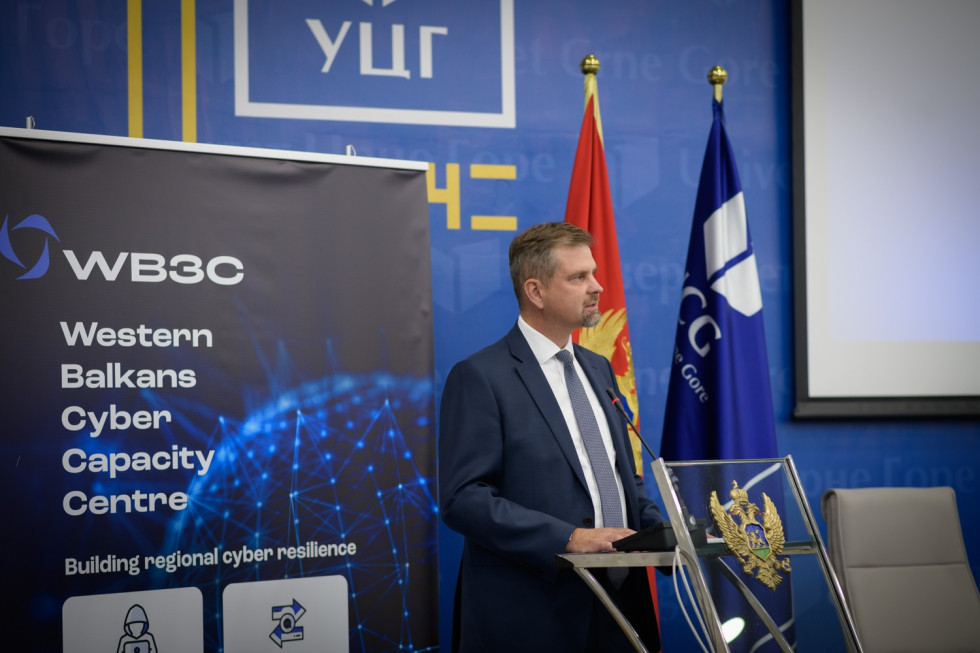Western Balkans Cyber Capacity Centre hosting its first regional conference

Tadej Rupel | Author Dalibor Sevaljević
On 11–12 June 2024, Slovenia, France and Montenegro organised the first regional conference of the Western Balkans Capability Centre (WB3C) in Podgorica. The event brought together experts from various international and business partner organisations of the WB3C, including the United Nations, the OSCE, the Global Forum on Cyber Expertise (GFCE), the European External Action Service (EEAS), the European Union Agency for Cybersecurity (ENISA) and others, as well as diplomatic representatives from the Western Balkans and the EU.
The regional conference was opened with introductory speeches by Ambassador Tadej Rupel, National Coordinator for External Aspects of Digitalization, AI and Cyber Security; Ambassador Anne-Marie Maskay, Ambassador of France to Montenegro; and Montenegrin Ambassador at Large for Cyber Security Vladimir Vučinić. They agreed that the establishment of the WB3C reflects a commitment to building a safer and more secure digital environment for the people of the Western Balkans. At a time when cyber threats are becoming more sophisticated and pervasive, it is imperative that we equip the Western Balkans with the necessary tools and knowledge to effectively combat these challenges. The WB3C aims to serve as a hub for innovation, cooperation and education in the fields of cyber security, cybercrime and cyber diplomacy.
The first day of the conference featured four panels. The first focused on cybersecurity and resilience of critical infrastructure in the region, and the second dealt with cybercrime and international criminal assistance in this area and was moderated by France. In the afternoon, participants attended the third panel on AI and ethics in cybersecurity moderated by Montenegro. Participating in the panel was also Slovenian expert Dr Maja Bogataj Jančič, founder of the Intellectual Property Institute. The conference successfully concluded with the fourth panel on cyber diplomacy moderated by Ambassador Tadej Rupel.
The Slovenian panel focused on the importance of cyber diplomacy in the Western Balkans, a region which remains strategically relevant in this field, as evidenced by continued investment in cybersecurity capacity building. Panellists included Erna Čatić, European External Action Service (EEAS), Hybrid Threats and Cyberspace Division; Vladimi Radunović, Director of Cybersecurity and e-Diplomacy at Diplo Foundation; Dr Andreja Mihailovic, Teaching Associate at the Faculty of Law, University of Montenegro; Mahé Dersoir, Cyber Policy Unit, Ministry for Europe and Foreign Affairs, France; Demosthenes Ikonomou, European Union Agency for Network and Information Security (ENISA); and Nikolas Ott, Senior Manager in Microsoft's European Government Affairs. The panellists discussed the role of cyber diplomacy in strengthening security and peace in the region by exploring the roles of different stakeholders in capacity building and identifying opportunities for strategic partnerships. They focused on cyber conflict prevention, crisis management and the promotion of international standards for a secure cyberspace, highlighting the achievements and challenges of international cooperation.
On the second day of the conference, the Diagonale Cyber Prediagnostic Tool was presented and gifted to the Western Balkan countries that had participated in the Diagonale prediagnostic process (Albania, Bosnia and Herzegovina, Montenegro, Kosovo, North Macedonia and Serbia). Individual workshops were later held with these countries, with Slovenian experts from the Government Information Security Office participating as advisers.

